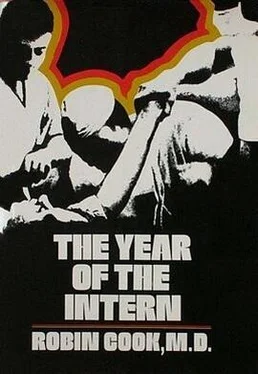Suddenly he stopped dead in the middle of the sentence and stared at the wall again. Then he looked at me and asked, “Would you take my blood pressure? I’m worried if s too high.”
I didn’t mind taking his blood pressure, but the room held no equipment. I went out for a pressure cuff, slightly dazed by the sudden, concise, and overwhelming history of a paranoid schizophrenic. On my way back, a nurse tried to give me another chart, but I waved her off, saying that I wasn’t finished with my present patient.
Back in the room, my patient had his sleeve rolled up in anticipation. He was intensely interested as I put the cuff around his arm, and he tried to see the gauge when I pumped it up. His pressure was 142/96. I told him it was slightly elevated, but consistent with his agitation. Actually, I was a little surprised at its height. Then I asked him what had happened after he got out of the hospital.
“Which time?” he asked.
“You were hospitalized more than once?”
“Twice. I told you.”
“What happened after the first hospitalization?”
“Everything went fine. I saw my psychiatrist regularly. Then, out of the clear blue sky, I started getting nervous, like now, and it got worse and worse, until I had to go back in the hospital for another four months.”
“How long was the interval between hospitalization?” I asked.
“About a year and a half. The real problem was that we could never figure out why it happened the second time. I wasn’t paranoid, just nervous. I had what they call all-pervading anxiety. Then my psychiatrist started to talk about pseudoneurotic schizophrenia, but I didn’t understand that so well, even though I read a lot about it. That’s why this situation worries me so much. I’m nervous now, really nervous. I have that same anxiety like before I went into the hospital the second time, and I can’t stand it. I don’t want things to go crazy again. I don’t know why I should be feeling like this now. Everything has been going fine lately. Even my business is good.”
I realized that he must have been psychologically well compensated. He had been able to make a new home in Hawaii and even to start a business. Oddly, I felt nervous, too, but of course, for different reasons and to a different degree. I was exhausted, but my trouble could be cured with a little sleep and relaxation. His was long-term, and, besides, he was worried that he might go suddenly out of control. A nurse opened the door, started to say something, and then closed it when she saw us talking.
“Do you have many friends here?” I asked.
“No, not really. I’ve never had very many friends. I prefer to stay home and read. I just don’t enjoy going out and sitting in bars and drinking. It seems like such a waste of time. I guess I don’t have very much in common with other people. I like to surf now and then, and I have a couple of guys I go surfing with, but not always. Most of the time I surf by myself.”
That amused me for a moment. A schizophrenic surfer. But in some ways his style was a little like mine. “How about your mother? Where is she these days?”
“She’s back in New York. She married that fellow she had been going with. My psychiatrist suggested I go away for a while. That’s why I came to Hawaii. It certainly has changed my life for the better.”
I got up and walked over toward the door. One of my legs had begun to go to sleep, and my foot was tingling. “What kind of business are you in?”
“Photography,” he answered. “I’m a photographer, a free lance, but I also do some industrial work. That’s what keeps me busy.” He got up to stretch and walked toward the other end of the room, near the chair. I turned around, put my hands behind my back, and leaned on the door. He seemed a little calmer, slightly relieved of his anxiety.
“What about women?” I asked, a little hesitantly, wondering what had become of those latent homosexual tendencies he mentioned earlier.
He looked at me briefly after the words left my mouth, and then he sat down in the chair, looking at the floor. “Fine, just fine. Never better. In fact, I’m getting married very soon to a fine girl. That’s why I want to be sure everything is all right with me. I don’t want to spend any more time in the damn hospital. Not now.”
I could understand his concern. By voicing it, he had suddenly moved the conversation to a more personal plane. Not that we hadn’t been talking very personally already; but the fact that he connected a desire to get married with his mental difficulties made it easier for me to understand and empathize with him. After all, if he could pull it off and establish a real relationship with his fiancée, she might be the means to a permanent compensation. At least, it was a chance. Unlike many mentally disturbed people, this guy was really trying. I liked that. I sat down on the bed, near the chair he was in.
“That’s good,” I said. “You’re overcoming your basic problem.”
“Yeah, it’s wonderful,” he repeated, without much emotion.
The fact that schizophrenics display blunted affects appeared in my mind from some dim psychiatry lecture. It gave me a momentary feeling of understanding and academic pleasure.
“When are you getting married?” I asked, to see if I could get any emotional response from him.
“Well, that’s one of the problems,” he said. “She hasn’t really set a date yet.”
That comment set me back somewhat. “But she has agreed to marry you, hasn’t she?”
“Certainly she has. But she just hasn’t decided exactly when we should get married. In fact, I was planning to ask her again tonight if we could get married during the summer. I’d like to get married this summer.”
“Well, why don’t you?” I asked. I began to formulate a definite impression of a case of a schizophrenic’s hypersensitivity toward any sign of rejection. Perhaps his anxiety had risen because he was afraid of being rejected by the girl. All signs led to it.
“I can’t tonight,” he said.
“Why not?” This was a crucial point. If things went smoothly, he could be golden; but if she rejected him, it could be devastating. He knew it, too.
“Because she called this morning and said she couldn’t see me tonight. When I asked her why not, she just said she had something important to do. She does that every so often.”
I knew he was in a difficult position. The more he pushed, the more he came to. depend on his fiancée for mental stability. I didn’t know what to say. We had reached a sort of impasse, and I thought now might be the time to give him some Librium or something. Then he started talking again.
“Maybe you know her,” he said. “She’s a nurse in this hospital.”
“What’s her name?” I was curious.
“Karen Christie,” he said. “She lives very close to the hospital, just across the street.”
His words smashed into my brain, tearing down carefully constructed walls of defense and carrying everything away. I felt my jaw drop open involuntarily and a glaze cover my eyes, reflecting the confusion and disbelief inside. I struggled hard to regain my outward composure. He was sunk too deep in his own troubles to notice my discomfort. He went on, describing his relationship with Karen. Now, twenty seconds after the revelation, I was outwardly calm again, and listening, but inside, my own urgent messages robbed his words of all meaning. We were like two men discussing the same subject, but in different languages.
So here was the “boyfriend,” the “fiancé.” I was sharing Karen with a schizophrenic who depended totally on her for mental equilibrium, whose world fell apart when that compensation was denied him, as it had been by Karen’s decision to stay home with me tonight. In a grotesque but very real way, we had exchanged roles: he was now the therapist and I the patient. How fitting that I sat on the bed and he was in the chair. About a half hour earlier, I had felt rejected because Karen could only see me late at night, after eleven. At the same time, I had illogically blessed my luck that she had another man willing to take her out, but bringing her home in time for beer and sex with me. The fact that I had been sharing a role with a schizophrenic made it tempting to identify with him, to see myself in the same light. I wondered how much of my own personality was schizophrenic. But surely I wasn’t schizophrenic; my grasp of reality was too good. I couldn’t believe I had any delusions, because, if anything, I was the realist, especially about my role as a intern. Besides, I never hallucinated. I would have known, I thought. Wouldn’t I have known?
Читать дальше












